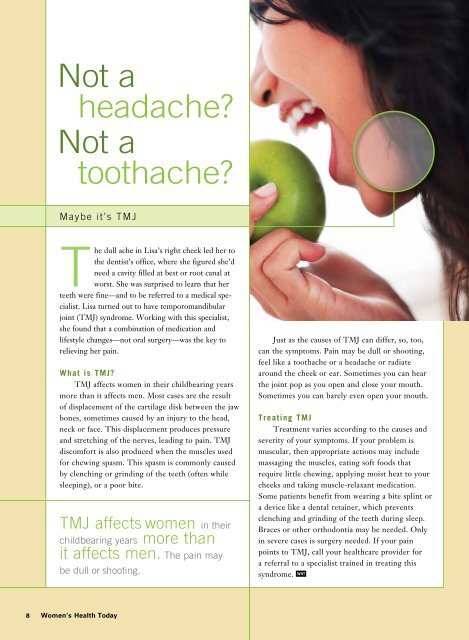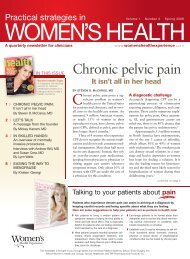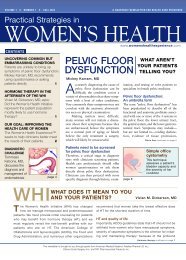Marg helgenberger's - The Christ Hospital
Marg helgenberger's - The Christ Hospital
Marg helgenberger's - The Christ Hospital
Create successful ePaper yourself
Turn your PDF publications into a flip-book with our unique Google optimized e-Paper software.
Not a<br />
headache?<br />
Not a<br />
toothache?<br />
Maybe it’s TMJ<br />
<strong>The</strong> dull ache in Lisa’s right cheek led her to<br />
the dentist’s office, where she figured she’d<br />
need a cavity filled at best or root canal at<br />
worst. She was surprised to learn that her<br />
teeth were fine—and to be referred to a medical specialist.<br />
Lisa turned out to have temporomandibular<br />
joint (TMJ) syndrome. Working with this specialist,<br />
she found that a combination of medication and<br />
lifestyle changes—not oral surgery—was the key to<br />
relieving her pain.<br />
What is TMJ?<br />
TMJ affects women in their childbearing years<br />
more than it affects men. Most cases are the result<br />
of displacement of the cartilage disk between the jaw<br />
bones, sometimes caused by an injury to the head,<br />
neck or face. This displacement produces pressure<br />
and stretching of the nerves, leading to pain. TMJ<br />
discomfort is also produced when the muscles used<br />
for chewing spasm. This spasm is commonly caused<br />
by clenching or grinding of the teeth (often while<br />
sleeping), or a poor bite.<br />
TMJ affects women in their<br />
childbearing years more than<br />
it affects men. <strong>The</strong> pain may<br />
be dull or shooting.<br />
Just as the causes of TMJ can differ, so, too,<br />
can the symptoms. Pain may be dull or shooting,<br />
feel like a toothache or a headache or radiate<br />
around the cheek or ear. Sometimes you can hear<br />
the joint pop as you open and close your mouth.<br />
Sometimes you can barely even open your mouth.<br />
Treating TMJ<br />
Treatment varies according to the causes and<br />
severity of your symptoms. If your problem is<br />
muscular, then appropriate actions may include<br />
massaging the muscles, eating soft foods that<br />
require little chewing, applying moist heat to your<br />
cheeks and taking muscle-relaxant medication.<br />
Some patients benefit from wearing a bite splint or<br />
a device like a dental retainer, which prevents<br />
clenching and grinding of the teeth during sleep.<br />
Braces or other orthodontia may be needed. Only<br />
in severe cases is surgery needed. If your pain<br />
points to TMJ, call your healthcare provider for<br />
a referral to a specialist trained in treating this<br />
syndrome. WHT<br />
<br />
Women’s Health Today
















